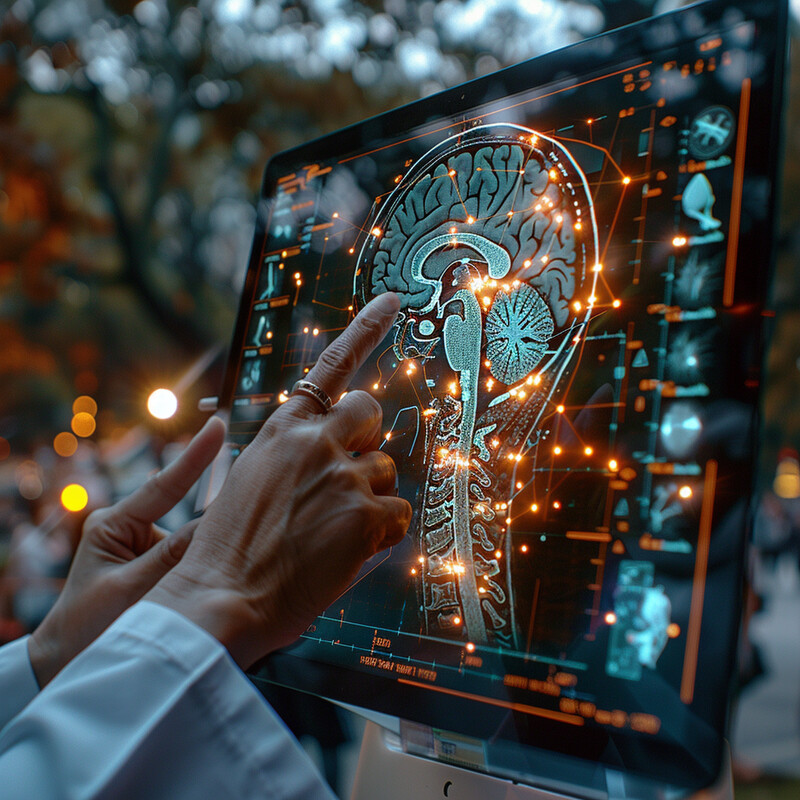1. Automated Patient Triage
AI-driven triage systems in telemedicine assess patient symptoms and urgency during virtual consultations. They use chatbots or questionnaires to gather symptoms and quickly prioritize cases, ensuring that critical patients get prompt attention. This automation streamlines the intake process by directing patients to the appropriate level of care (e.g., emergency care vs. routine clinic) without immediate human screening. As a result, healthcare resources are allocated more efficiently, wait times are reduced, and patients with serious conditions are identified faster. Overall, AI triage enhances the responsiveness and scalability of telemedicine services by handling initial assessments around the clock.

Studies show that machine learning–powered triage can outperform traditional methods in accuracy and efficiency. For example, an AI-enhanced telemedicine triage system was found to improve triage accuracy and safely redirect low-acuity patients away from unnecessary emergency visits. In a comprehensive review of 29 studies, AI triage models consistently demonstrated better risk assessments – accurately predicting which patients needed hospitalization and improving resource allocation – compared to standard nurse-led triage. By rapidly analyzing patient-reported symptoms and history, AI reduces human error and bias in triage decisions, leading to more consistent outcomes. This evidence underscores AI’s role in prioritizing urgent cases and preventing under- or over-triage in remote care settings.
2. Diagnostic Support
AI is augmenting diagnostic capabilities in telemedicine by analyzing medical data (like images, lab results, and patient history) and providing decision support to clinicians. During virtual visits, AI tools can highlight abnormal findings on imaging (e.g., flagging a suspicious shadow on an X-ray) or suggest possible diagnoses based on symptom patterns. This support helps doctors make more informed decisions, even when patients are remote. It speeds up the diagnostic process by rapidly processing information and can increase accuracy by catching details a human might miss. In essence, AI acts as a “second pair of eyes,” enhancing physician confidence and potentially improving diagnostic outcomes in telehealth settings.

Research indicates that AI-driven diagnostic aids can significantly improve accuracy in remote evaluations. For example, a 2024 study of an AI clinical decision support system for telehealth found that it improved clinicians’ ability to correctly diagnose strep throat from smartphone images. In this experiment with 121 telehealth providers, the AI tool analyzed throat photos and led to better predictions of strep infection than traditional scoring methods. Likewise, AI image-analysis algorithms have shown high sensitivity in detecting findings on medical scans during virtual consults, helping identify issues like pneumonia on chest X-rays or tumors on MRIs earlier. As of 2024, roughly 35% of telemedicine platforms integrate AI features to improve diagnosis and patient management, reflecting how widespread this support has become. By rapidly processing large datasets and past cases, AI diagnostic support systems reduce diagnostic errors and assist telehealth clinicians in making timely, accurate decisions.
3. Personalized Treatment Plans
AI enables telemedicine to deliver highly personalized treatment plans by analyzing individual patient data. Machine learning algorithms can comb through a patient’s medical history, genetic information, lifestyle factors, and even real-time health metrics to tailor recommendations. In practice, this means two patients with the same diagnosis might receive different care plans optimized for their specific needs – for example, adjusted medication doses or custom lifestyle interventions. Telehealth platforms use AI to continuously update these plans as new data comes in (such as response to treatment or new symptoms). This personalization aims to improve efficacy of treatments, reduce side effects, and engage patients in their own care, since the recommendations fit their unique profile.

AI-driven personalization is proving effective in creating tailored care. Generative AI systems, for instance, can synthesize a patient’s demographics, comorbidities, treatment preferences, and past responses to craft a customized care plan. A recent review noted that such AI tools analyze vast datasets – including medical records and even genetic data – to recommend treatments specifically suited to the individual, which improves treatment efficacy and minimizes adverse effects. Early evidence in chronic illness care shows that AI-personalized plans lead to better disease control: for example, AI algorithms adjusting insulin and diet for diabetes patients helped achieve better blood sugar levels compared to standard one-size-fits-all advice. By continuously learning from each patient’s outcomes, AI can update treatment recommendations in real time. This dynamic personalization ensures care plans remain optimal as a patient’s condition evolves, highlighting AI’s role in more precise, patient-centric telemedicine.
4. Medication Management
AI is improving medication management in telemedicine by automating and monitoring many aspects of pharmacotherapy. Smart apps and platforms use AI to remind patients to take their medications on schedule, track their adherence, and even detect patterns (like missed doses or irregular use). For example, an AI-powered telehealth app might send a patient a personalized alert if they forget a pill, or notify clinicians if a patient’s wearable device indicates a dose was skipped. AI can also cross-reference patient data to flag potential drug interactions or suggest dosage adjustments. By actively engaging patients with prompts and using data (from electronic pill bottles or self-reports), these systems help patients stick to their treatment plans. This leads to more consistent medication use, which is crucial for managing chronic conditions and improving outcomes.

Evidence from recent studies shows AI tools significantly enhance medication adherence and safety. A 2025 systematic review of AI interventions in chronic disease found that most AI-based adherence tools (e.g. conversational reminders, smart pill dispensers) led to improvements in medication adherence outcomes. These tools provide personalized support – for instance, an AI virtual assistant can educate patients about their medications and send tailored dose reminders, which studies report has boosted adherence rates by up to 50% in some populations. AI can also reduce errors: in hospital settings, AI-driven medication management systems cut medication error rates by automating checks (one report noted up to a 75% reduction in errors with such systems). By tracking usage and symptoms, AI algorithms identify when patients aren’t following regimens and alert healthcare providers for follow-up. This proactive management has translated into better disease control – for example, AI-assisted programs for hypertension saw improved blood pressure due to higher medication compliance. Overall, AI’s 24/7 monitoring and personalized prompts are making medication management more effective and patient-centered in telehealth.
5. Mental Health Assessments
AI is being used in telemedicine to augment mental health assessments by analyzing subtle cues in a patient’s behavior, speech, or writing that might indicate psychological conditions. During virtual therapy sessions or mental health check-ins, AI algorithms can perform real-time analysis of a patient’s voice tone, speech patterns, or word choice to detect signs of depression, anxiety, or other issues. For example, an AI might flag monotone speech and slow response as potential markers of depression, prompting a clinician to probe further. Some telehealth platforms also use AI-based questionnaires or chatbots that screen for mental health symptoms before a patient even speaks with a provider. These AI assessments provide an additional data point – essentially an “early warning system” – helping clinicians identify patients who may need more in-depth evaluation. By continuously monitoring and learning from large datasets of mental health profiles, AI tools aim to make remote mental health screening more objective and sensitive to changes that humans might overlook in short visits.

AI shows considerable promise in detecting and even treating mental health conditions remotely. Various studies have reported that AI models can classify mental health states with high accuracy by analyzing patient data. In fact, AI algorithms have achieved accuracy rates as high as 90–97% when identifying certain conditions (like distinguishing depression vs. no depression) from speech and text inputs. For instance, natural language processing of patient journal entries or voice recordings can successfully flag depression or PTSD by recognizing linguistic and acoustic patterns associated with these disorders. Beyond assessments, AI-based conversational agents (chatbots) have demonstrated therapeutic potential: a 2023 meta-analysis found that AI chatbots significantly reduced users’ depression symptoms (moderate effect size) and psychological distress compared to control conditions. Users of these mental health chatbots often report improvements comparable to traditional therapy for mild-to-moderate anxiety and depression. That said, clinicians remain cautious – one survey noted that while patients were about 84–96% satisfied with AI-assisted sessions, some providers worry about AI’s reliability and the need for human empathy. Still, the evidence suggests AI can effectively support mental health assessment in telemedicine by providing early detection of issues and augmenting the therapeutic process between remote sessions.
6. Remote Patient Monitoring
AI enhances remote patient monitoring (RPM) by continuously tracking patients’ health data from wearables and home devices and alerting providers to any concerning changes. In telemedicine, patients with chronic conditions (like heart disease or diabetes) often use devices that measure vital signs (heart rate, blood pressure, glucose levels, etc.) at home. AI systems aggregate and analyze this stream of data in real time. If an AI detects an anomaly – say a patient’s blood pressure spiking or heart rhythm becoming irregular – it can immediately notify healthcare providers or the patients themselves to take action. This proactive surveillance means that potential problems (like an oncoming asthma attack or signs of heart failure) are caught early, even before the patient notices symptoms. AI also helps filter the vast amount of RPM data, so clinicians see actionable insights rather than being overwhelmed by raw numbers. By facilitating early interventions and round-the-clock oversight, AI-driven RPM improves safety and reduces the need for patients to be physically present for routine monitoring.

Remote monitoring studies show that AI-driven analysis can significantly improve patient outcomes and reduce emergency events. In the United States, approximately 41% of the population now uses a smart wearable device to continuously monitor health indicators like pulse or activity level – AI algorithms sift through this continuous data to identify subtle trends. Notably, an AI-enhanced RPM program can detect health deterioration early: one literature review concluded that coupling AI with remote vital signs monitoring led to earlier detection of adverse events and helped prevent complications, thereby lowering hospital readmission rates. For example, AI monitoring of heart failure patients’ weight and blood pressure has predicted decompensations days in advance, allowing timely medication adjustments and avoiding hospitalization. Clinical trials have reported that such systems lead to fewer ICU admissions because patients receive intervention before a crisis occurs. By automating data analysis, AI also reduces the burden on healthcare staff – one hospital system noted that automating alerts for RPM data freed up nurses from routine data checks to focus on direct patient care. These improvements underscore how AI makes remote monitoring more responsive and effective, transforming raw home-health data into lifesaving actions.
7. Chronic Disease Management
AI is empowering patients and providers in managing chronic diseases (such as diabetes, hypertension, or COPD) through telemedicine. In chronic care, continuous management and early detection of complications are key – AI assists by analyzing patient data over time to provide regular risk assessments and personalized advice. Telehealth apps with AI can coach patients on lifestyle changes (diet, exercise) tailored to their condition and even predict flare-ups (like a COPD exacerbation) before they fully develop. For example, an AI might analyze a diabetic patient’s glucose readings, diet logs, and insulin doses, then suggest regimen adjustments to maintain optimal blood sugar control. AI-driven systems also remind patients to perform routine checks (foot exams for diabetics, peak flow for asthma, etc.) and can alert healthcare teams if a patient’s readings indicate they’re deteriorating. By delivering frequent, customized feedback and catching warning signs, AI helps keep chronic conditions stable and prevents small issues from becoming emergencies – all via telemedicine platforms that connect patients with their care team remotely.

Studies highlight that integrating AI into chronic disease management improves care efficiency and patient outcomes. A bibliometric analysis in 2025 observed that AI applications in chronic disease management have enhanced patient care efficiency, optimized treatment strategies, and reduced healthcare costs in this field. Concretely, AI’s predictive capabilities allow for early warnings – for instance, in diabetes care, AI algorithms monitoring glucose trends can predict hyperglycemic events hours in advance, prompting preventive action. Evidence of outcome benefits is growing: one systematic review of 39 trials reported that about 73% of AI-assisted interventions for chronic diseases led to significantly better patient outcomes (such as improved disease control or fewer complications) compared to standard care. For example, AI-supported hypertension programs achieved greater blood pressure reduction than usual care by continuously adjusting therapy based on home BP readings. Similarly, heart failure patients in telehealth programs with AI monitoring had lower rates of hospitalization and mortality than control groups. Patients also engage more with AI-driven programs – a study noted higher medication adherence and lifestyle change maintenance when interactive AI coaching was provided. These findings show that AI not only streamlines chronic care (through automation and personalization) but also tangibly improves long-term health outcomes for patients managed via telemedicine.
8. Health Education and Engagement
AI personalizes health education in telemedicine, making patient engagement more interactive and effective. Traditional one-size-fits-all educational materials (pamphlets, generic advice) are being replaced by AI-generated content tailored to each patient’s condition, preferences, and literacy level. For example, an AI chatbot on a telehealth platform can answer a patient’s questions about their condition 24/7, using language that’s easy to understand. AI can also send patients timely educational nudges – like a video on breathing exercises to a patient with asthma ahead of pollen season, or a reminder article about low-salt diets to a patient with high blood pressure. By analyzing patient data, AI determines what information is most relevant for that individual and delivers it in an engaging way (through quizzes, personalized reports, etc.). This approach keeps patients actively involved in their care, as they receive information that feels personally relevant. Overall, AI-driven education in telehealth empowers patients with knowledge and encourages them to take an active role in managing their health.

Emerging evidence indicates that generative AI and personalized content delivery substantially improve patient understanding and engagement. A 2025 review found that AI tools significantly enhance patient health literacy by making complex medical information more accessible, personalized, and interactive, thereby empowering patients in their care. For instance, AI can simplify a detailed surgical consent form into plain language or create a customized video explaining a new diagnosis using the patient’s own medical data – such tailored education leads to better comprehension than generic materials. In population health programs, patients who received AI-personalized educational emails (with content matched to their health profile) were 50% more likely to engage with health coaches and showed sustained improvements in metrics like HbA1c and blood pressure. AI-driven engagement also helps keep patients adherent to care plans: one program using an AI chatbot to regularly check in on patients’ well-being saw higher rates of follow-through on doctor’s recommendations and appointment attendance. While caution is needed to ensure information accuracy, AI’s ability to deliver the right educational content to the right patient at the right time has shown great promise in keeping patients informed and involved via telemedicine.
9. Predictive Analytics
AI-driven predictive analytics in telemedicine shifts healthcare from reactive to proactive. By analyzing large volumes of patient data across populations – including electronic health records, wearable sensor data, and even social determinants – AI can identify patterns and risk factors that human clinicians might not easily see. These predictive models forecast future health events or trends: for example, an AI might predict which patients are at high risk of hospitalization in the next 30 days, or which region might see a spike in flu cases. In telemedicine, such forecasts enable providers to intervene early (reaching out to at-risk patients before they deteriorate) and to allocate resources where they will be needed most. Health systems use predictive analytics to develop “early warning systems” for things like sepsis, heart attacks, or mental health crises, even for patients monitored at home. This means care can be initiated sooner – potentially preventing the predicted adverse event or lessening its impact. Essentially, predictive analytics adds a forward-looking intelligence layer to telehealth, helping providers stay one step ahead of potential health problems on both individual and public health levels.

Predictive analytics has demonstrated tangible benefits in telehealth outcomes by enabling earlier interventions. AI models can process real-time data from remote monitors and flag subtle changes that herald a serious event; for instance, an AI system monitoring seniors at home was able to predict falls and health declines by analyzing changes in daily activity patterns. In clinical practice, predictive algorithms have been used to successfully anticipate hospital readmissions – one hospital’s telehealth program reported that an AI risk predictor reduced 30-day readmissions by identifying high-risk patients and prompting follow-up before they decompensated. Similarly, AI can forecast population health trends: a machine learning model analyzing telemedicine data across clinics predicted an uptick in asthma exacerbations several days before ER visits increased, allowing preemptive distribution of inhalers in the community. A 2024 scoping review found that the most common AI analytics in telecare were anomaly detection and risk prediction, particularly for conditions like Parkinson’s and cardiovascular disease. Providers using these tools have seen improvements such as fewer emergency visits and shorter hospital stays, because patients get treated proactively based on risk scores. While many predictive telehealth models are still in pilot phases, the trend is clear: AI-driven predictions are helping healthcare move toward preventive, population-level management rather than reacting only after a crisis occurs.
10. Language Translation Services
AI-powered language translation is breaking down communication barriers in telemedicine, allowing patients and providers who speak different languages to communicate more freely. Real-time translation services – often driven by advanced AI models – can transcribe and translate a doctor’s spoken words into a patient’s native language (and vice versa) almost instantaneously during a virtual visit. This technology expands access to care for limited-English-proficient patients, who no longer have to wait for a human interpreter to join a session. It also helps Deaf or Hard-of-Hearing patients through AI-generated captions or sign language avatars. In practice, an AI translation tool might enable a telehealth session where an English-speaking physician and a Spanish-speaking patient converse, each hearing or reading the other’s statements in their own language in real time. By providing on-demand multilingual support, AI translation services improve patient understanding, safety, and satisfaction in telehealth – ensuring that language differences do not impede the quality of care delivered remotely.

AI translation in healthcare has advanced rapidly, though it works best for simple dialogues. Telehealth providers are adopting these tools to automate translation, reduce wait times, and scale multilingual communication for patients with limited English proficiency. Recent systematic reviews show that AI medical translation platforms (like Google Translate or specialized medical translators) can often achieve high accuracy for brief clinical communications. Reported accuracy rates range from about 83% up to 97.8% when translating from English into another language for common medical phrases. For example, an AI might reliably translate “Take two pills twice a day with food” into Spanish with minimal error. Patient surveys indicate strong approval of AI interpreters – in one study, 84–96% of patients were satisfied with AI-facilitated communication, appreciating the immediacy. However, accuracy can drop for more complex or nuanced statements (translations into English had lower accuracy, 36–76% in that review). Moreover, about 1% of AI-generated medical transcripts can contain errors or “hallucinated” phrases, which, while small, pose risks if not caught. Because of this, experts stress that a human interpreter or oversight is still essential for critical conversations. In summary, AI language services greatly enhance telemedicine accessibility and efficiency, but integrating human quality checks ensures that medical nuances and patient safety are fully maintained.